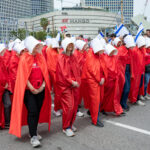In urban and rural Bangladesh, class divisions are stark. Workers are struggling against dangerous conditions, low wages and repressive violence. – Editors.
 Bangladesh is a land in the throes of rapid capitalist development and industrialisation. Much of the world’s clothing is made in the country’s garment factories, the number of which is approaching, or may have reached, 5,000. Bangladesh is second only to China as an exporter of apparel, and the industry is still expanding. Many of the world’s ships end up in Bangladeshi breakers’ yards.
Bangladesh is a land in the throes of rapid capitalist development and industrialisation. Much of the world’s clothing is made in the country’s garment factories, the number of which is approaching, or may have reached, 5,000. Bangladesh is second only to China as an exporter of apparel, and the industry is still expanding. Many of the world’s ships end up in Bangladeshi breakers’ yards.
What gives Bangladeshi industry its special niche in the world system is low wages. It is, in the words of the Bangladeshi Export Processing Zones Authority, “Asia’s low cost production base”.
There is always room at the bottom. Very likely in a few years other countries, perhaps Madagascar or Mozambique, will develop mass production industries exporting to the global market and undercut Bangladesh as providers of cheap labour power, just as Bangladesh has undercut countries like China and Indonesia.
Determined to stay competitive by holding down labour costs, employers and the state have reacted harshly to the workers’ efforts to gain union negotiating rights and better pay and conditions. The Awami League government of Sheikh Hasina claims to act as impartial “referee/umpire” between workers and employers, while maintaining an “investment friendly” environment. In practice, a powerful bloc of factory owners and their relatives sits in parliament. Legislation to protect workers’ pay, hours, conditions and health and safety is enforced sporadically, at best. Workers’ protests are regularly met with a violent police crackdown, with arrests, beatings, tear gas and even shootings.
Bangladesh has an elected government, multiple parties and an independent press, but it is far from being a stable bourgeois democracy. Violence in politics is frequent, including disappearances and murders of politicians, businessmen and suspected criminals. In a country that spent 15 years under military rule, the army and security forces are powerful, able to overstep the law and government control. Retired soldiers often find a second career as security officers for industrial companies.
This is the background to the abduction, torture and murder of labour organiser Aminul Islam in April 2012. By his own account, Aminul Islam had previously been kidnapped and beaten by agents of the National Security Intelligence Agency (NSI). This was in 2010, in the aftermath of workers’ protests that gained a raise in wages for garment workers. Since then, Aminul Islam had been under surveillance by the NSI.
The killing was widely and promptly condemned, not only by international unions and human rights groups but also by governments (including U.S. secretary of state Hillary Clinton) and business associations representing the buyers and importers. All called on the government of Bangladesh to investigate the crime properly and bring to justice those responsible. Without result. Sheikh Hasina has personally denied that the NSI was implicated, and the police are supposedly unable to identify the murderers.
112 workers were killed in the Tazreen Fashions factory fire in Ashulia in November 2012, a disaster widely reported in the world media that exposed the dangerous conditions in many factories. The fire ignited among piles of yarn and fabric stored next to generators on the ground floor of the eight storey building; by law, these materials should have been kept in a fireproof room. The building lacked sprinklers or outside fire escapes. Two of the three staircases became impassable because of fire and smoke. When fire alarms sounded, workers who got up to evacuate the building were told by managers that it was just a test, and to go back to their sewing machines. So imperative was the drive for production, so little the concern for the workers’ safety, that the most basic safety principle, leave the building at once when you hear a fire alarm, was ignored.
This was no isolated accident. More than 600 garment workers have perished in workplace fires since 2005. Many have compared this fire to another a century ago, the Triangle Shirtwaist factory fire in New York, 1911. In many ways, the situation facing garment workers in Bangladesh today resembles the state of the industry in the United States back then. Just like the Triangle Fire, the Ashulia disaster occasioned widespread outrage and substantial protests. Some 100,000 people gathered at the funeral of 53 unidentified victims.
Such factories stand at one end of a global supply chain that extends to familiar stores in the high streets and shopping malls of the West. Tazreen Fashions was making clothes for Walmart, Sears, C&A and others. The retail companies operate a monitoring system that is meant to assure decent conditions for the workers – a system that glaringly failed in this instance. The insistence on decent labour conditions is contradicted and in practice overwhelmed by the demand for low costs and quick turnarounds. Retailers including Walmart and Sears have said they were unaware that Tazreen Fashions was making their clothing. Complex supply chains involving several layers of sub-contractors and agents are characteristic of modern capitalism. Quite possibly, no one is aware of all the links in the chain. This has been seen, in a different context, in the horsemeat-sold-as-beef scandal in Western Europe.
Despite the rapid development of industry, most Bangladeshis are poor farmers. Rice is the main food crop. Jute (used to make string, sacking and carpet backing) is the main export crop. Other crops include sugar cane, tea and tobacco. About 60 percent of the rural population own little or no land and work as sharecroppers or labourers. A further 20 percent of farmers are considered marginal, raising crops on a fraction of a hectare, but not enough to feed a family through the year. Sharecroppers have to provide all inputs to agriculture: tools, seed and fertiliser as well as labour, but still yield half the crop to the landowner after harvest. Because their wages are so low, farm labourers must often apply to the proprietor for an advance on wages. A daily wage of 100 taka may be reduced to 70 taka (less than $1 U.S.) if paid in advance. This leads to a cycle of low earnings and chronic debt, to the advantage of the landowner.
People still go hungry even in times of good harvests, though not so much as in the past. Most live on a limited diet of rice, dal (lentils) and fish, usually together in a curry. Tea with milk and sugar is popular when people can afford it, but many drink only water most of the time and millions have no access to safe, clean drinking water. International agencies have provided many wells, so that rural people no longer need to draw water from rivers and ponds. Unfortunately, ground water is often contaminated with naturally occurring arsenic.
Living standards have risen, but from a terribly low base line. Only 43 percent of adult Bangladeshis are literate (the global average is 79 percent). In the countryside, people usually go barefoot. The diseases of poverty – cholera, leprosy and tuberculosis – are all present, and thousands die each year of malaria. The country is also vulnerable to seasonal cyclones and storm surges that may destroy towns and villages and kill thousands of people.
The lives and struggles of women in Bangladesh are a tremendously important subject, but beyond the scope of this article. One observation: industrialisation is changing gender relations. Being able to work for wages outside the household tends to raise the independence and esteem of women whose traditional status within families is very lowly and subordinate. It breaks down the isolation of women, bringing them into daily contact with others. At the same time, women workers face particular problems, such as sexual harassment.
The potential forces to transform life and society in Bangladesh are the workers’ movement, the women’s movement and the peasant movement (which of course are interspersed and not separate). International support and solidarity will be very important too.






0 Comments